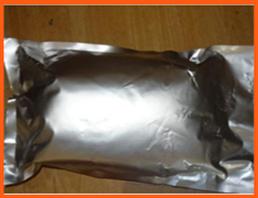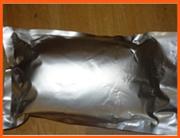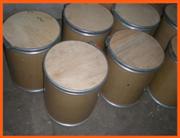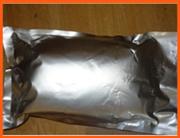Quick Detail:
Product Name: Phenacetin
CAS: 62-44-2
EINECS: 200-533-0
Assay: 99%
Formula: C10H13NO2
MW: 179.2157
Density: 1.099g / cm3
Water-soluble: 0.076 g / 100 mL
Vapor Pressure: 3.21E-05mmHg at 25 ° C
Uses: Anti-inflammatory drugs
Appearance: White or almost white crystalline powder
Export Markets: Global
Description
The painkiller phenacetin was the world's first synthetic pharmaceutical drug. It was developed by an American chemist and began distribution in 1887. Phenacetin was often accompanied by aspirin and caffeine in what were called APC pills, which were widely distributed during and after World War II. The use of phenacetin in the U.S. was discontinued in the 1980s because of links to cancer and other adverse side effects, but it remains available in some countries.
Phenacetin is a white crystalline powder with the chemical composition C10H13NO2. It was first developed by Harmon Northrop Morse in 1878. In addition to its pain-reducing properties, it also has been used as a fever-reducer, a treatment for rheumatoid arthritis and a treatment for intercostal neuralgia, a rare disorder that causes pain in the nerves around the ribs. It was one of the first painkillers that was not derived from opium while at the same time being absent of anti-inflammatory qualities.
In 1983, the U.S. Food and Drug Administration (FDA) banned phenacetin in the U.S. because of its discovered carcinogenic properties and its link to kidney failure. The FDA stated that phenacetin alone is reasonably believed to be a human carcinogen, or cancer-causing agent, and that painkiller mixtures containing the drug are known human carcinogens. There has been little evidence found that phenacetin alone is a human carcinogen because it usually has been administered in combination with other drugs.
Application
Phenacetin was widely used until the third quarter of the twentieth century, often in the form of an "A.P.C." or aspirin-phenacetin-caffeine compound analgesic, as a remedy for fever and pain. An early formulation (1919) was Vincent's APC in Australia. However the U.S. Food and Drug Administration ordered the withdrawal of drugs containing phenacetin in November 1983, owing to its carcinogenic and kidney-damaging properties (Federal Register of October 5, 1983 (48 FR 45466)). Phenacetin was also banned in India.
As a result some branded, previously phenacetin-based preparations continued to be sold, but with the phenacetin replaced by safer alternatives. A popular brand of phenacetin was Roche's Saridon, which was reformulated in 1983 to contain propyphenazone, paracetamol and caffeine. Coricidin was also reformulated without phenaceti.
Phenacetin is a metabolite of phenacetiwith similar analgesic and antipyretic effects, but the new formulation has not been found to have phenacetin's carcinogenicity.
Phenacetin is now being used as a cutting agent to adulterate cocaine in the UK and Canada, owing to the similar physical features of the two drugs.
Due to low cost phenacetin is used for research into the physical and refractive properties of crystals.
Phenacetin is an ideal compound for this type of research.
Preparation
The first synthesis was reported in 1878 by Harmon Northrop Morse.
Phenacetin may be synthesized as an example of the Williamson ether synthesis: ethyl iodide, paracetamol, and anhydrous potassium carbonate are refluxed in 2-butanone to give the crude product, which is recrystallized from water.
Uses
Phenacetin was widely used until the third quarter of the twentieth century, often in the form of an "A.P.C." or aspirin-phenacetin-caffeine compound analgesic, as a remedy for fever and pain. An early formulation (1919) was Vincent's APC in Australia. However the U.S. Food and Drug Administration ordered the withdrawal of drugs containing phenacetin in November 1983, owing to its carcinogenic and kidney-damaging properties (Federal Register of October 5, 1983 (48 FR 45466)). It was also banned in India. As a result, some branded, previously phenacetin-based preparations continued to be sold, but with the phenacetin replaced by safer alternatives. A popular brand of phenacetin was Roche's Saridon, which was reformulated in 1983 to contain propyphenazone, paracetamol and caffeine. Coricidin was also reformulated without phenacetin. Paracetamol is a metabolite of phenacetin with similar analgesic and antipyretic effects, but the new formulation has not been found to have phenacetin's carcinogenicity.
Phenacetin is now being used as a cutting agent to adulterate cocaine in the UK and Canada, owing to the similar physical features of the two drugs.
Due to low-cost phenacetin is used for research into the physical and refractive properties of crystals. It is an ideal compound for this type of research.
Hubei XinRunde Chemical Co., Ltd is a renowned pharmaceutical manufacturer. We can offer high quality products at competitive price in quick delivery with 100% custom pass guaranteed. Never stop striving to offer our best service is our philosophy. We have Flexible and Untraceable payment terms. As a leading manufacture, our products have been exported to Germany, Norway, Poland, Finland, Spain, UK, France, Russia, USA, Brazil, Mexico, Australia, Japan, Korea, Thailand, Indonesia, Uruguay and many other countries.
1. Quality.Every batch of steroid powders have tobetested by our QC(quality control) before they are allowed to sell.
2 . Delivery We have stock, so we can delivery quickly at the very day when receive the payment. Within 24 hours after receiving the payment Lead time 4 or 7 days.
3 . Discreet package Safelyand Professionally Disguised Package Guaranteed. For your safety and to insure delivery all products will be packed in a discreet way to prevent any suspicions, no steroids related name will appear on the parcels. high successful delivery rate
4 . Warm after-sale service Any of your question would be solved for the first as soon as possible.
Phenacetin 62-44-2 Pharmaceutical Raw Materials
Phenacetin 62-44-2 Pharmaceutical Intermediate
Phenacetin 62-44-2 Raw Chemical Product
Phenacetin 62-44-2 Supplier & manufactuer


 China
China

